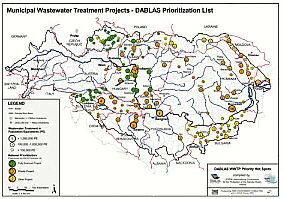 |
Participants at the ministerial conference in Brussels on 26 November 2001
signed a joint declaration on the "Protection of Water and Water-related
Ecosystems in the Wider Black Sea Region”. In order to ensure the implementation
of the Declaration, the DABLAS Task Force was formed to serve as a platform
for co-operation and to facilitate financial arrangements for the implementation
of pollution reduction and ecosystem rehabilitation projects in the wider
Black Sea region. A Working Group on Prioritisation was created and charged
with selecting priority projects on the regional level. The group was given
one year to set prioritisation criteria and to create a project database,
a framework for the funding of projects, and a prioritised list of projects
to be presented to the DABLAS Task Force for discussion and endorsement.
The presidents and the secretariats of the Danube and the Black Sea commissions
were asked to update information on the Danube and the Black Sea regions,
to create by-country lists of municipal wastewater treatment investments
- with particular attention to nutrient reduction - that could attract financing,
especially loans. They were also asked to prepare project fiches containing
technical and financial data and information that would help priority projects
find funding by IFIs, bilateral donors and EU financial instruments.
The Working Group on Prioritisation consisted of representatives from Germany,
Austria, Hungary, Romania, Bulgaria (vice chair), the Czech Republic (vice
chair), from the Danube River Basin (ICPDR) and the Black Sea (BSC) secretariats,
representatives of the European Investment Bank, the European Bank for Rural
Development, the Council of Europe Development Bank, the World Bank, Project
Preparation Committee (PPC, vice chair) and consultants preparing the project
fiches. The European Commission, DG Environment provided financial support
to the Danube River Basin and the Black Sea secretariats enabling them to
develop an "Operational Framework for the Prioritisation of Projects”.
The tasks facing the DABLAS project team for the Danube River Basin included:
• revision of lists of national projects of the Joint Action Programme
and selection of municipal priority projects. This activity has been carried
out under the responsibility of the ICPDR national heads of delegations;
• selection of international and national consultants;
• revision of project fact sheets by international consultants;
• completion of the project fact sheets by national consultants;
• revision of the basin-wide database for investment projects by international
consultants;
• development of prioritisation indicators by a team of international
consultants, based on criteria provided by the DABLAS Working Group;
• designing, developing and making operational the Danube database
for the prioritisation of municipal investment projects.
The report "Prioritisation of Municipal Investment Projects in the
Danube River Basin” was prepared by the ICPDR Secretariat and presented
in two volumes: Volume I: Summary Report and Volume II: Project Fact Sheets.
Contributions to the report were received from:
• Alexander Zinke, project management, responsible for overall coordination
of project activities;
• James Lenoci, environmental engineer, responsible for preparing and
guiding the work of national experts, preparation of summary tables and
development of technical indicators for project prioritisation;
• Alex Hoebart, information specialist, responsible for developing
and making operational the project database and introducing mechanisms for
project prioritisation;
• Reinhardt Wanninger, international financial consultant, responsible
for reviewing project fact sheets and developing economic and financial
indicators for project prioritisation.
In the ICPDR Secretariat, Mihaela Popovici, technical expert for water management,
was entrusted with overall organisation and follow-up of the project. Conceptual
preparation, organisation and coordination was assured by Joachim Bendow,
executive secretary of the ICPDR. A total of 158 fact sheets have been developed
for the 11 Danube River Basin countries (see map). The projects differ in
size from more than 1,000,000 population equivalent (PE) (Belgrade, Bucharest,
Budapest, Sarajevo, Zagreb) to appx. 10,000 PE. Among the 158 projects,
45 are fully funded with a total of EUR622m. The investment required for
the remaining 113 projects is EUR2,567m, of which EUR2,121m have not yet
been secured. Project data and privatisation criteria have been programmed
into the database.
Prioritisation criteria
Prioritisation criteria were developed and grouped into five categories:
| Category | Default value % |
| I Environmental Impact | 30 |
| II Black Sea Impact | 20 |
| III Finance-ability | 30 |
| IV Technology efficiency | 10 |
| V Compliance | 10 |
The weighting factors were considered as default values to allow flexibility
in the evaluation. As more reliable finance-ability information is obtained
in the future, the default values can be easily changed in the database.
Prioritisation ranking was made for 113 projects. Of the evaluated 113 projects,
only 20 were found to be reasonably well prepared and have secured partial
financing. An arbitrary division was made for the 20 top-scoring projects,
so that a short list of projects could be developed.
Follow-up activities
During the last DABLAS Task Force meeting in Brussels on 17 February 2003,
a draft list of 32 projects drawn from the two lists for the Danube and
the Black Sea regions was presented, refined and endorsed. A joint PPC/DABLAS
meeting will be organised on 4 April 2003 to present the short list of priority
projects to the donor community to raise the profile of these projects and
to secure further funding. The DABLAS database is accessible in the ICPDR
DANUBIS information system.